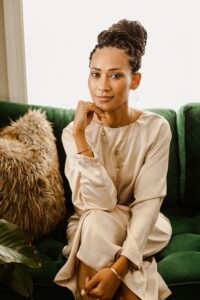Today Book Club Babble is pleased to introduce and interview Chloe Dulce Louvouezo , emotive storyteller extraordinaire who explores the nuances of Black women’s diverse experiences in each episode of her podcast, Life, I Swear.
In one-on-one interviews and personal prose, the podcast centers on personal stories that offer universal insights into topics relevant to modern women’s lives, from identity and family to trauma and motherhood, told through the lens of Black women. In this stunningly illustrated essay collection inspired by the popular podcast Life, I Swear, prominent Black women reflect on self-love and healing, sharing stories of the trials and tribulations they’ve faced and what has helped them confront pain, heal wounds, and find connection. Chloe, welcome to Book Club Babble, can you start by telling us about your book?
Chloe Dulce Louvouezo: To me, this book represents and offers community. Life, I Swear: Intimate Stories from Black Women on Identity, Healing, and Self-Trust is part memoir, part collection of essays which chronicles transformation and growth by and for modern-day Black women. It is unique in that it’s a coffee table book that features photography and personal narratives of the journeys of 25 diverse Black women who offer testimonies of living through pain and joy with raw honesty and unapologetic self-love, with my own personal essays woven throughout the book. Together this anthology tells a story of resilience, introspection, and the reimagining of what healing looks like personally and as a collective from the lens of Black women.
Maribel Garcia: Your podcast centers on personal stories that offer universal insights into topics relevant to modern women’s lives, As a woman of color myself, I know how important it is that in this book, those insights are told through the lens of Black women. Can you tell our readers why it’s not just important for women of color to give their own unique experiences, but for others to hear them?
Chloe Dulce Louvouezo: Black women are often put in positions where we have to negotiate or make a case for our voice to be heard. In many environments, whether in career or in relationships, society often muffles or mutes the voices of Black women, tells their story for them, or speaks on their behalf. This book flips the roles by giving Black women the mic, and anyone who reads will absorb these stories without negotiating their value. Society historically has also characterized Black women in a very monolithic way with limited personas and experiences that don’t give room for us to be diverse and nuanced. When the rest of the world hears and reads stories about Black women that challenge this monolithic assumption, it helps to humanize us and expand their understanding of us. When those stories are told by Black women themselves, they illustrate our texture in a way that can’t be done any other way.
Maribel Garcia: What inspired you to write this book? Is there a story behind it?
Chloe Dulce Louvouezo: I wrote this book at the tail end of a year-long sabbatical from work, which I took to take care of my mental and physical health. Prior to the year, my home life was very planned out but under the veil it was also on the brink of cracking. When everything crumbled, it forced me to re-evaluate what was most important to me, who I was without those things I had previously attached myself to, and what patterns or narratives I needed to revisit, release and rewrite. The essays I wrote in this book, while they all reflect on who I was before, they also make space for the woman I am growing into. I think we all deserve permission for reinvention, and I wanted to offer that to myself and to other Black women. I wanted to create something that centered on Black women, giving us an opportunity to be the protagonists and lead characters in our own stories.
Maribel Garcia: What did you learn when writing the book?
Chloe Dulce Louvouezo: When curating this collection of essays, I learned how to be delicate with other people’s stories. It’s a huge responsibility to tell someone’s story or to put their story into the world. I had to build trust with each of the 25 contributors of the book, give them space or support in identifying what parts of their stories they chose to tell, and partner with them in the writing and editing process. It was important to me that their experience participating in this book project was comforting and not triggering, especially for those essays that were particularly vulnerable. I had to learn to handle the tenderness of these essays with care so that they and readers could appreciate storytelling as a tool for healing.
Maribel Garcia: What surprised you the most during the process of writing the book?
Chloe Dulce Louvouezo: I was most surprised by how much I had grown between the time I submitted the manuscript and the time I had to edit my own essays. The first time I had put pen to paper I was still grappling with many of the things I had written of. I had done a great deal of living, reflecting, and forgiving of myself and certain experiences in between that time. When I returned to my drafts, I was in a position to frame my narrative from a place of more personal clarity and solace and with perspectives that had shifted and matured. It was as if even in the editing process, I was building a deeper relationship with my younger self through grace.
There is a quote I love that says “Edit your life frequently and ruthlessly. It’s your masterpiece after all.” I think of that in figurative and literal ways. As our own storytellers and as we design the life we want, we should keep editing our lives and how we define ourselves as freely as we’d like along our journey. No one else can own that but us.
Maribel Garcia: What does the title mean? How did you come up with it?
Chloe Dulce Louvouezo: “Life, I swear” has been a theme since my mid-twenties. My roommate and I would say it after those long conversations about all of the frustrations and the excitement of life. We lived in New York City at the time, a place that complemented that season of our lives where we were in between ambiguity and strong desires for what they would become. The saying “life, I swear…” is a reflection or a sigh around the aspects of life that may feel fragile, ongoing, or unexpected. For all of the heartbreaks and breakthroughs that we experience and that are captured in this book, this title felt so suiting because it is about the full spectrum of our relationship with our lives and ourselves.
Maribel Garcia: When did you first realize you wanted to be a writer?
Chloe Dulce Louvouezo: I knew I wanted to be a writer after reading Joan Didion’s essay Goodbye to All That, which was about her relationship to New York City in the 1950’s and 60’s. In 2012, during that romantic year in the city with my roommate, I also read the book Goodbye to All That: Writers on Loving and Leaving New York, a collection of 28 essays by diverse and interesting women about their devotion to and departure from the city that defined a chapter of their lives. As someone who has been very transient in my own life having relocated nearly every year until I became a mother, my relationship with places has been deeply personal. Reading how all of these women articulated their love affair with a place so expansively in such detailed ways really captivated me. Right after closing that book I felt an urgency to do the same.
Maribel Garcia: What is your work schedule like when you’re writing?
Chloe Dulce Louvouezo: Because I had taken extensive time away from my job during my sabbatical, I was able to make writing my full-time priority. From 9 am to 5 pm between dropping my son off at school and picking him up at the end of the day, I would write. That was the first time I felt like a real writer, when stories were the only thing occupying my thoughts and I had the space to get excited about my obsession with words. When I returned to work and the editing process continued, my schedule changed and I was limited to writing only early mornings and late nights. It was a practice of balance, intention, and discipline I was grateful to hone.
Maribel Garcia: Do you have any suggestions to help me become a better writer? If so, what are they?
Chloe Dulce Louvouezo: I encourage other writers to lead with curiosity. Ask questions that provoke deeper analysis. If you describe something that happened, how did it feel? What were the consequences on the heart, on community, or on a pattern of behavior or thoughts? And when you’re writing your own stories, translate that curiosity to a personal practice of self-examination. As terrifying as vulnerability can be, ask hard questions of yourself and allow your raw honesty to reveal dimensions of who you are or where you’re from that you’ve hidden or dismissed. The process of writing our own stories can be deeply therapeutic when we are open to it helping us discover more of ourselves and the world around us.
Maribel Garcia: Chloe, thank you so much!

ABOUT THE AUTHOR
Chloe Dulce Louvouezo is a Congolese-American writer and advocate for women. As a storyteller, she supports creativity and belonging of underrepresented women and seeks to deepen understanding about and within communities. Chloe is the executive producer and host of the Life, I Swear podcast and author of Life, I Swear: Intimate Stories from Black Women on Identity, Healing and Self-Trust (HarperCollins Publishers, November 2021), through which she explores nuances and insights around identity, mental wellness, and healing, told through the lens of women from the Black diaspora.
Rooted in her global citizenship, Chloe’s fifteen-year career in communications has advanced diverse and inclusive storytelling at domestic and global organizations addressing education, poverty, and mental health. She currently serves as Senior Communications Officer at The Bill & Melinda Gates Foundation on its Public Engagement and Insights team. Prior to joining the foundation, she served as Director of Communications for Services for the Underserved, one of the largest human services agencies in New York City, and Akilah Institute for Women, a women’s college in Kigali, Rwanda.
Chloe is a founding board member of HURU, which creates sacred spaces for rest experiences that foster emotional wellbeing and wholeness. She earned her B.A. in Journalism from Howard University with a concentration in Cultural Anthropology and her M.P.S. in Public Relations and Corporate Communications from Georgetown University. She holds a professional certificate in Diversity and Inclusion Leadership from Cornell University.
Website: https://www.chloelouvouezo.com/


